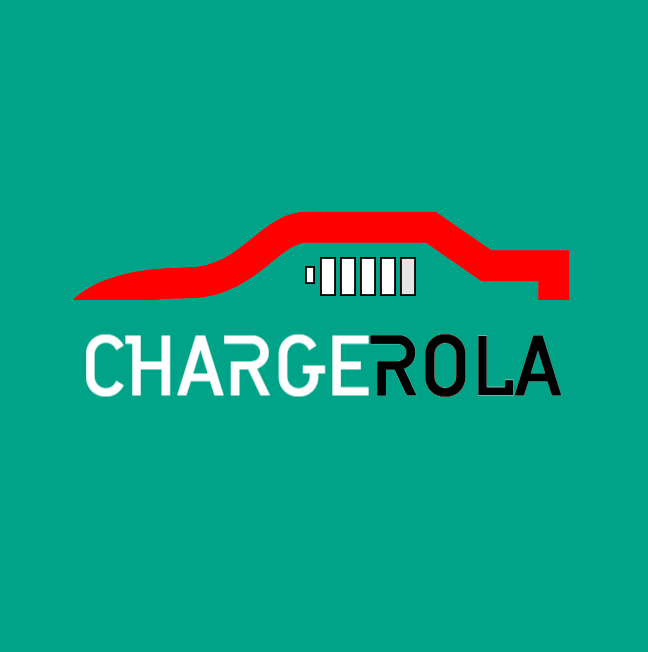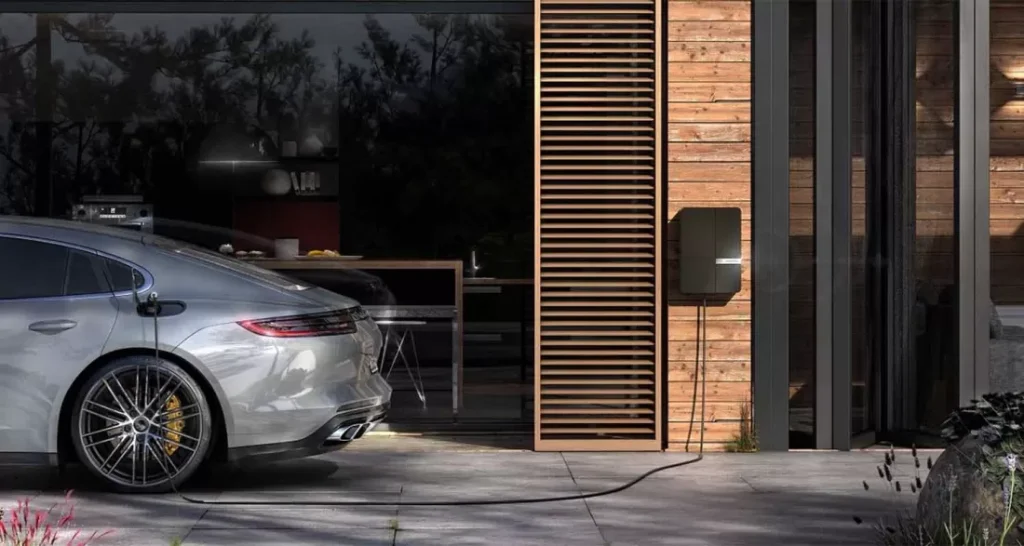
How do you charge an electric car at home? This simple guide explains what your options are for charging electric cars at home and how you can save money on EV charging costs.
Driving and charging an electric car is easy – trust us. Electric car drivers have, by and large, come to love the experience. However, anything new can seem daunting especially when you’re used to filling up at a petrol station; using electric cars is a very different experience. So let’s explore the basics of electric car charging at home.
How do you charge your electric car at home?
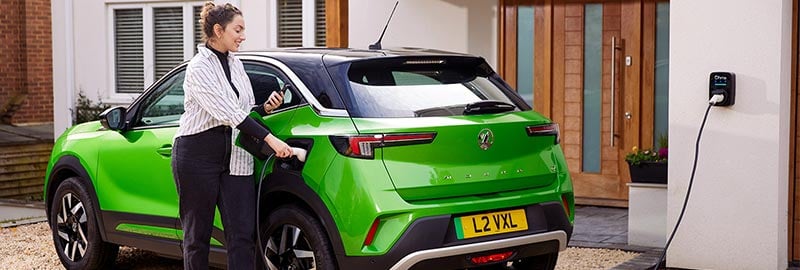
Home charging an electric car is not that different to charging your phone.
You need a power supply and something to connect it to – in this case, you’ll connect one end of the charging cable into the socket on your electric car and the other into the electricity supply.
There are essentially two main ways of home charging your electric vehicle:
1. A conventional three-pin plug and socket
Electric vehicles should come with a cable and adapter so you can plug into your home’s electricity supply via a conventional three-pin socket.
However, this method is slow only adding around 10 miles of range per hour to electric cars.
It can also cause the plug socket to wear out faster.
2. A dedicated home charging point
A dedicated home car charge point (sometimes called a “wallbox”) are much faster and safer for long-term use. They are mounted to the external wall of your home and should be in a convenient location for the charging cable to reach your vehicle.
Electric car chargers, such as the ones we sell and install, can drastically reduce the charging time for electric vehicles, typically adding around 30 miles of range per hour.
You’ll need a qualified electrician/installer such as Smart Home Charge to complete the EV charger installation for you.
BENEFITS OF A HOME CAR CHARGER INSTALLATION
-
Fast, reliable charging of your electric car
-
Charge schedules – you decide when the car chargers (perhaps when your electricity rate is cheapest, or when home charging tallies with low domestic use)
-
Safety measures – home chargers are built for the express purpose of charging electric cars, so they have built-in safety features
-
Correct installation – dedicated home chargers are installed by qualified and Government-approved installers such as Smart Home Charge
-
Weather-proof – chargers must withstand the British weather, so they are robust units
-
No more trips to the petrol station – save time by “fuelling” your electric car overnight with a home charger
How much does it cost to install a home car charging point?
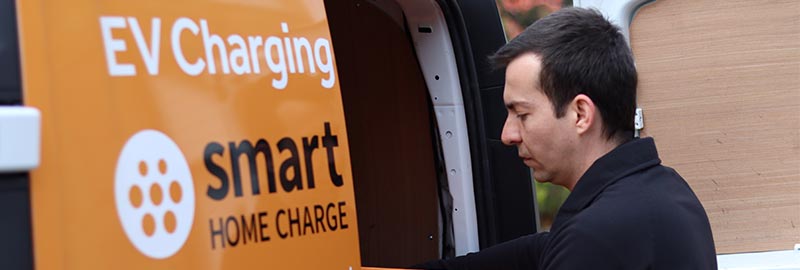
The cost of a home electric vehicle charge point installation varies, depending on the charge point you choose and also the complexity of the work involved.
Prices for EV charging points cost from around £932 including installation with Smart Home Charge, but we will assess the job and provide you a quote for the work before you pay so you can make an informed decision.
You can also learn more about what’s involved in our guide to a home car charger installation. In no time you can be on the road with your electric vehicle!
Browse our product range
We have a range of chargers to suit most people’s charging needs and budgets. Browse our range and click “request a quote” to get started.
BROWSE OUR RANGE
What are the other benefits of a “smart” home car charger?

All the electric car charging points we sell are “smart”. This means the electric car charger connects to your home internet via WiFi or 4G to offer some additional features and functions.
The main benefit is that this allows you to remotely control your car’s charging schedule without having to hang around outside the charging point.
For example, if you want to charge your electric car overnight, or when your electricity prices might be cheaper, then the smart charger’s accompanying smartphone app will allow you to do this.
Smart chargers also allow you to see data on previous charging sessions, such as how much energy was used and an estimated cost.
This allows you to make an informed decision when it comes to choosing an electricity tariff.
Some chargers also include other smart features such as the remote locking feature found in the Easee One and Hypervolt Home – handy if you want to prevent unwanted use of your charger.
How do I know which charger I should choose?
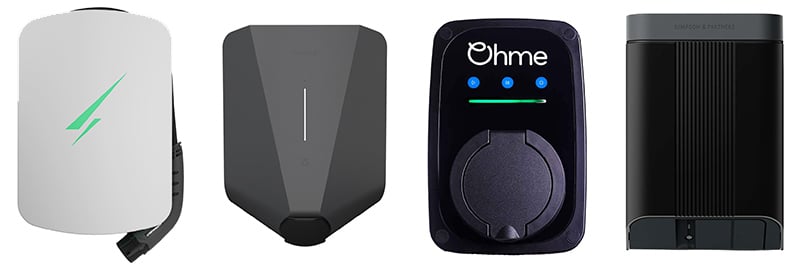
Chargers left to right: Hypervolt Home, Easee One, Ohme ePod and Simpson and Partners Home 7
Different chargers will suit different needs and budgets. If you’re not sure where to start, we have a number of guides and tools to help you:
- Read our guide on how to choose an EV charger
- Use our Compare EV Chargers Tool to compare features side by side
- Or use our Charger Selector Tool to help you get started
How much does it cost to charge an electric car at home?
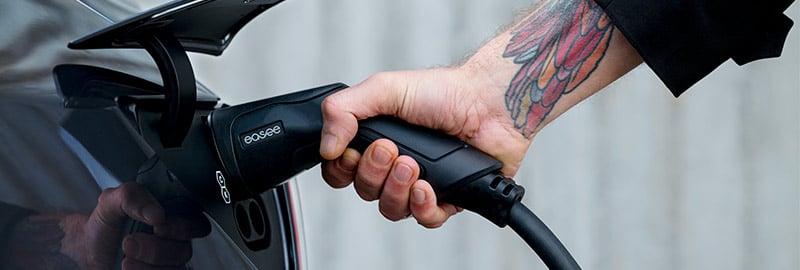
Ultimately, the cost to charge your electric car depends on its battery size and the cost of your home electricity.
We recommend using our Home Car Charging Cost tool to get an idea of electric car charging costs for different EVs and using different energy suppliers, to see how it fits into your ideal electricity bill and energy usage.
You can even calculate the cost using a simple sum.
You will need to know the battery size of your electric vehicle or the one you are considering buying/leasing, plus the price per kilowatt hour for your electricity – this should be on your energy bill. For example, 14p per kWh.
To calculate the cost of “filling up” your EV, use this formula:
Size of battery (kWh) x Cost of your electricity (pence per kWh) = the cost of charging your car from zero to full
For example, if you own a Renault Zoe R90, which has a 41kWh battery, and your electricity costs 14p per kWh, the calculation would look like this:
41 x £0.14p = £5.74
